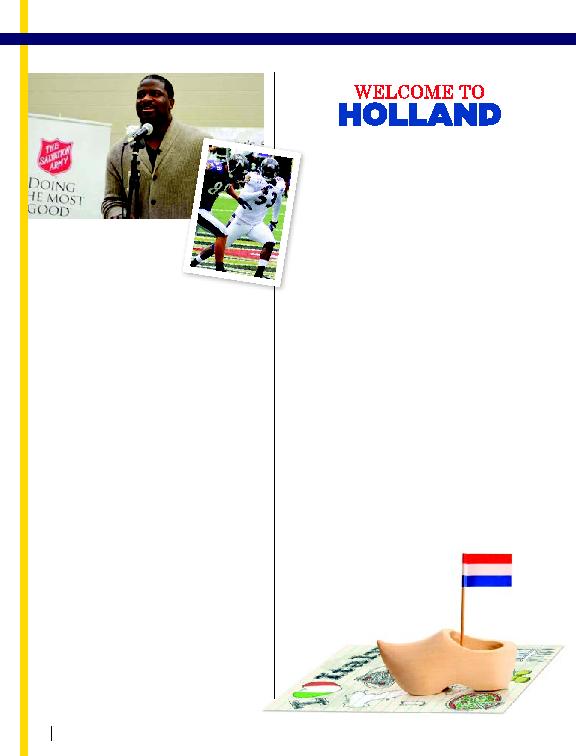
ing as the guy that's just pushing
people around,"
verbally abusing someone is the thing that is
most damaging."
clothing and because his family called a Salva-
tion Army shelter home for about a year in their
hometown of Philadelphia. McClain is one of
four players featured in "NFL Characters Unite,"
a USA Network documentary that probes their
experiences with childhood bullying and dis-
crimination.
his family during that difficult year of homeless-
ness, as well as other charities.
Army shelter whose family is going through the
kind of housing difficulties that the Raven de-
fenseman faced.
boy learned that what was happening to him
also happened to the football star.
ster thought people he knew might need. "That
was the idea we came up with ... to show how
to give to others," McClain said. "I believe that
truly is what empowers you."
Jameel McClain
is Tough on Bullying
Reprinted by permission of the author.
a fabulous vacation trip�to
Italy. You buy a bunch of
guide books and make your
wonderful plans. The Coli-
seum. The Michelangelo Da-
vid. The gondolas in Venice.
You may learn some handy
phrases in Italian. It's all very
exciting.
arrives. You pack your bags
and off you go. Several hours
later, the plane lands. The
stewardess comes in and
says, "Welcome to Holland."
land?? I signed up for Italy!
I'm supposed to be in Italy.
All my life I've dreamed of
going to Italy."
landed in Holland and there
you must stay.
a horrible, disgusting, filthy
place, full of pestilence, fam-
ine and disease. It's just a dif-
ferent place.
you must learn a whole new
language. And you will meet
a whole new group of people
you would never have met.
less flashy than Italy. But
after you've been there for
a while and you catch your
breath, you look around ...
and you begin to notice that
Holland has windmills ... and
Holland has tulips. Holland
even has Rembrandts.
Italy ... and they're all brag-
ging about what a wonderful
time they had there. And for
the rest of your life, you will
say "Yes, that's where I was
supposed to go. That's what
I had planned."
away... because the loss of
that dream is a very very sig-
nificant loss.
didn't get to Italy, you may
never be free to enjoy the
very special, the very lovely
things ... about Holland.
a fab